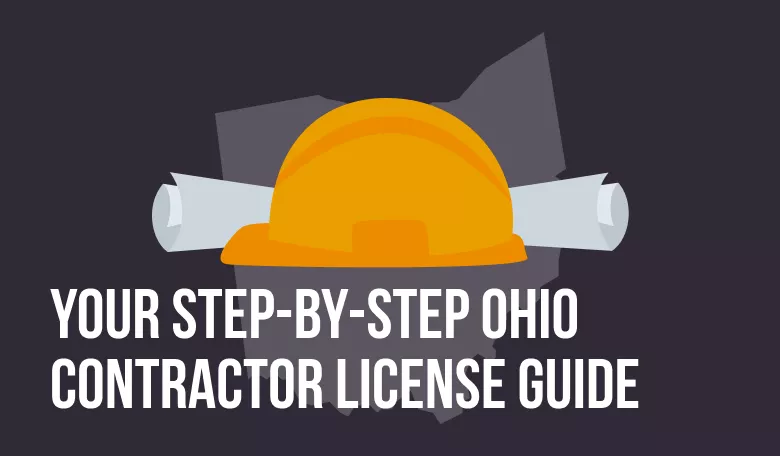Ohio Contractor License Guide: Everything You Need to Know

If you work on large scale construction projects valued at over $1,000, you may need to obtain an Ohio contractor license. State level licenses are issued by the Ohio Construction Industry Licensing Board (OCILB) for electricians, HVAC contractors, hydronic technicians, plumbers and refrigeration installers.
If you’re a general contractor or handyman, you may need to apply for contractor registration or a professional license at a local level.
To help ensure you’re fully compliant with the rules and regulations in the state of Ohio, we’re taking a look at everything you need to know about the Ohio contractor license.
Types of Contractor Licenses Available in Ohio
If you plan to work as a tradesperson in Ohio, it’s important you understand exactly which type of contractor license you require. The state currently issues a range of licenses for various specialties. Each type of license has its own prerequisites, so you’ll need to check exactly what’s required before you apply.
Ohio Electrician License
In Ohio, electricians who work on commercial projects are required to get licensed. However, Ohio does not require state-level electrician licenses for residential journeyman electricians or master electricians. In some cities, these professions are licensed at a local level.
HVAC Contractor License
In order to legally perform heating, air conditioning and refrigeration work in the state of Ohio, you must be a licensed contractor or a technician apprentice working under a licensed contractor. You’ll need to complete a number of years of work experience as a technician before you can become a contractor.
Plumbers License
As with HVAC contractors, a plumbing contractor working in the state of Ohio either needs to be licensed themselves or be working under a contractor with a plumber's license. Some cities, like Cleveland, Columbus, and Toledo, have their own additional licensing requirements.
General Contractor or Handyman License
Although general contractors and handymen aren’t required to obtain a state level license in Ohio, a number of cities and municipalities mandate local licenses or registration. Contact the governing body in your area to find out more.
Ohio Contractor License Requirements
All contractors in Ohio have to undergo a business licensing procedure. This is necessary in order to establish your business entity in the state.
Business Entity Registration
Your first step is to register your business with the Ohio Secretary of State. The entity forms that you can choose from include corporation, partnership, limited partnership, LLP, and LLC.
Trade Name
You have to file a trade name registration with the Secretary of State if you’re planning to use a different name for doing business than your company name.
Tax Requirements
You have to register with the Ohio Department of Taxation to meet the state’s tax criteria.
Applying for an Ohio Contractor License
Step 1. Determine Which License You Need
Before you can start applying for your Ohio contractor license, you’ll first need to determine exactly which license you require. If you work as a plumber, electrician or HVAC engineer, you’ll need to apply for a state level license from the Ohio Construction Industry Licensing Board. If you’re a handyman or general contractor, you’ll need to check the local laws with your municipality.
Step 2. Check Requirements
Each type of license has its own set of requirements. These requirements can change depending on your location, so make sure you talk to your local governing body to find out exactly what you need to do. In almost all municipalities, you’ll be required to register your business, complete a background check and pass a trade exam. You’ll also need to prove that you’re a U.S Citizen or legal alien, and that you’ve completed a set amount of work experience
If you’re a handyman or general contractor, you may need to apply for a local license or registration instead of state level accreditation. For example, if you’re based in Columbus and carry out home improvements on properties in which no more than three families are dwelling, you can apply for a Home Improvement Contractor License.
Step 3. Get Bonded
A contractor license bond is required for almost all contractor licenses in the state of Ohio. Surety bonds are there to ensure contractors abide by the rules and regulations governing their industry. They also provide financial compensation to anyone left out of pocket by a contractor with unscrupulous business practices.
Step 4. Arrange Insurance
You’ll need to have your business insurance in place before you begin trading. In Columbus, you’re required to have a minimum of $300,000 in general liability insurance. In Cleveland, you need at least $200,000 in liability insurance coverage, and in the city of Cincinnati, you need liability coverage of $100,000 in order to become a licensed contractor. Cincinnati also requires applicants to take out Ohio workers’ compensation coverage.
Step 5. Submit Your Application
Once you’ve checked you meet all set requirements, it’s time to collect your paperwork and submit your application. Along with your completed application form, you’ll need to include your certificate of liability insurance, your articles of incorporation (if applicable), your power-of-attorney form (if applicable), your social security or tax identification number and your application fee. The application fee varies from $25 to $100 depending on the type of license you’re applying for.
Provide a Surety Bond and Insurance
In most cases, obtaining an Ohio contractor license entails providing proof of insurance and bonding.
Worker’s Compensation Insurance
You have to get worker’s compensation insurance in case you will be hiring employees. Consult the Bureau of Workers’ Compensation for further information.
Liability and Property Damage Insurance
Applicants for contractor licenses may also have to obtain liability and property damage insurance. Here are the requirements in some cities:
- City of Columbus – minimum of $300,000 for damages to a single person and $500,000 for a single occurrence (liability insurance)
- City of Cleveland – minimum $200,000 coverage; $50,000 to $100,000 for bodily injury and $50,000 for property damage
Surety Bond
You may have to obtain a surety bond in order to get some types of Ohio contractor licenses. The bond works as a safety mechanism that safeguards the interests of your customers.
Depending on your location and the type of license that you’re applying for, you will have to post different Ohio contractor license bond amounts. They usually range between $5,000 and $25,000.
Here are some of the most popular:
- City of Columbus general contractors and home improvement contractors – $25,000 (use the official bond form)
- City of Cleveland general contractors – $25,000
You don’t have to pay the whole required amount to get bonded. Instead, you need to cover a fraction of it, which is called a premium. It depends on the strength of your personal and business finances. The typical rates for applicants with solid profiles are between 0.75% and 5%.
Fill out the short application form below to see your exact contractor license bond cost!
License Renewal and Expiration
You have to renew your license before it expires in order to legally continue your activities as a contractor. The expiration dates vary depending on your local authorities that have issued the license.
Do you need further information about obtaining your Ohio contractor license and bonding? You can reach us by calling 877.514.5146.
How to Verify your Ohio Contractor License
You can look up your license via the search option of the Department of Commerce. You can select the license type and input information about your company.
FAQs
Do You Need a Contractor License in Ohio?
If you plan to take on commercial projects as an HVAC engineer, a plumber or an electrician, you’ll need to get licensed or find a licensed contractor to supervise your work. If you’re a general contractor or handyman, you don’t need a state level license, but you may need to apply for a license or registration at a local level.
How Much Does it Cost to Get a Contractor License in Ohio?
The application fee for a contractor license in Ohio varies from $25 to $100 depending on the type of work you plan to do. As well as the application fee, you’ll also need to pay for your trade exam and professional training.
How Long Does it Take to Get a Contractor License in Ohio?
In most cases, you’ll need at least five years of experience under your belt before you can apply for a contractor license in Ohio. Once you’ve got all of the relevant experience and paperwork ready and submitted your application, it should take around 30 days for your license to be issued.
Are There Any Penalties for Non-Compliance with Ohio Contractor License Requirements?
If you work as a commercial contractor without a valid license in Ohio, you risk a fine or even a jail sentence. Make sure you’re compliant with all rules and regulations by checking with your local governing body.
- Fast and Secure Application
- Nationwide Coverage
- Approval in Minutes
- Money Back Guarantee
Recommended Articles
- Fast and Secure Application
- Nationwide Coverage
- Approval in Minutes
- Money Back Guarantee
- Image

- Image

- Image

Lance Surety Bond Associates, Inc. is a surety bond agency based out of southeastern Pennsylvania that is able to write all surety bond types in all 50 states. We are dedicated to servicing all of our customers' surety bonding needs throughout the country and guarantee competitive rates, timely responses, and unparalleled customer service.







